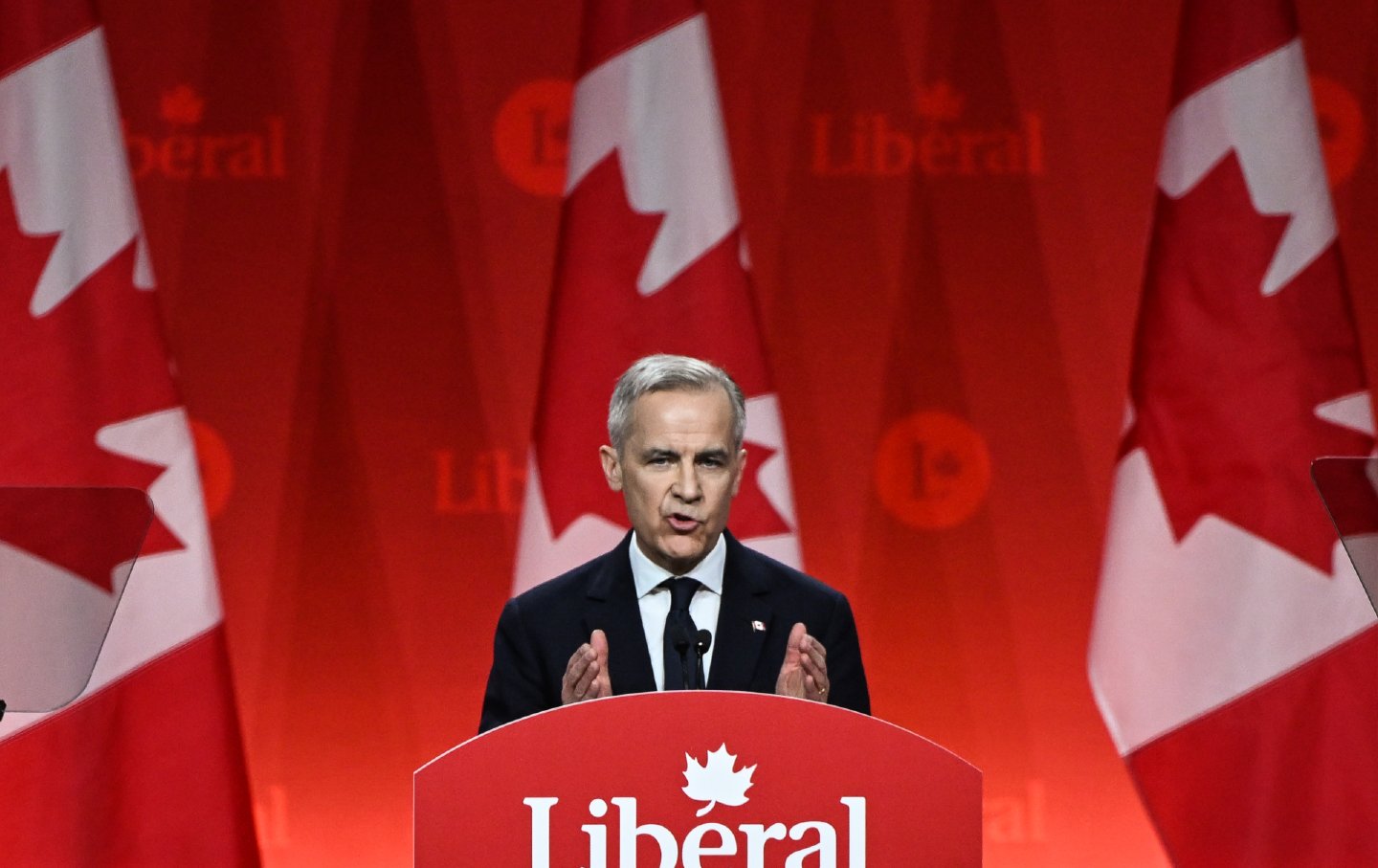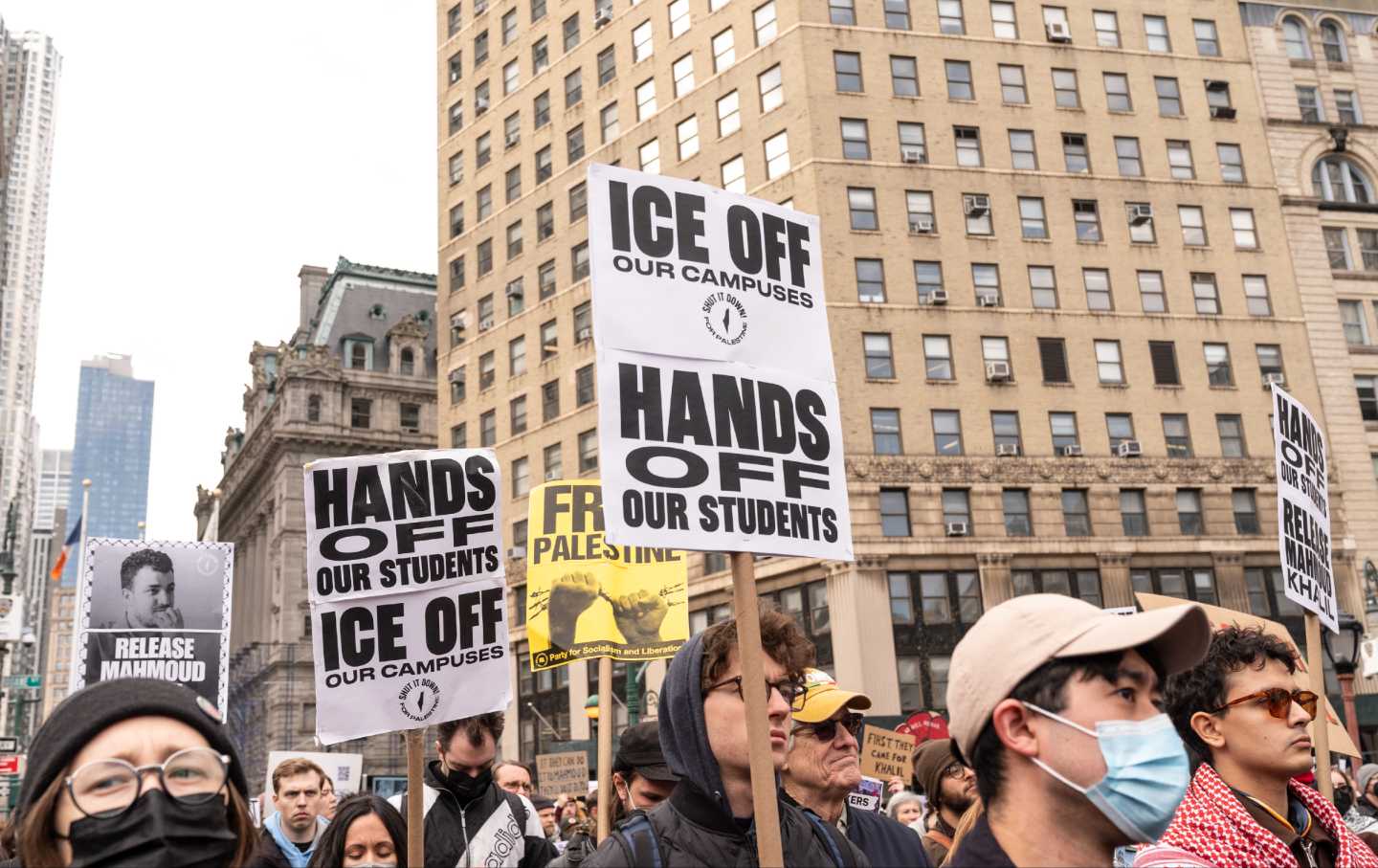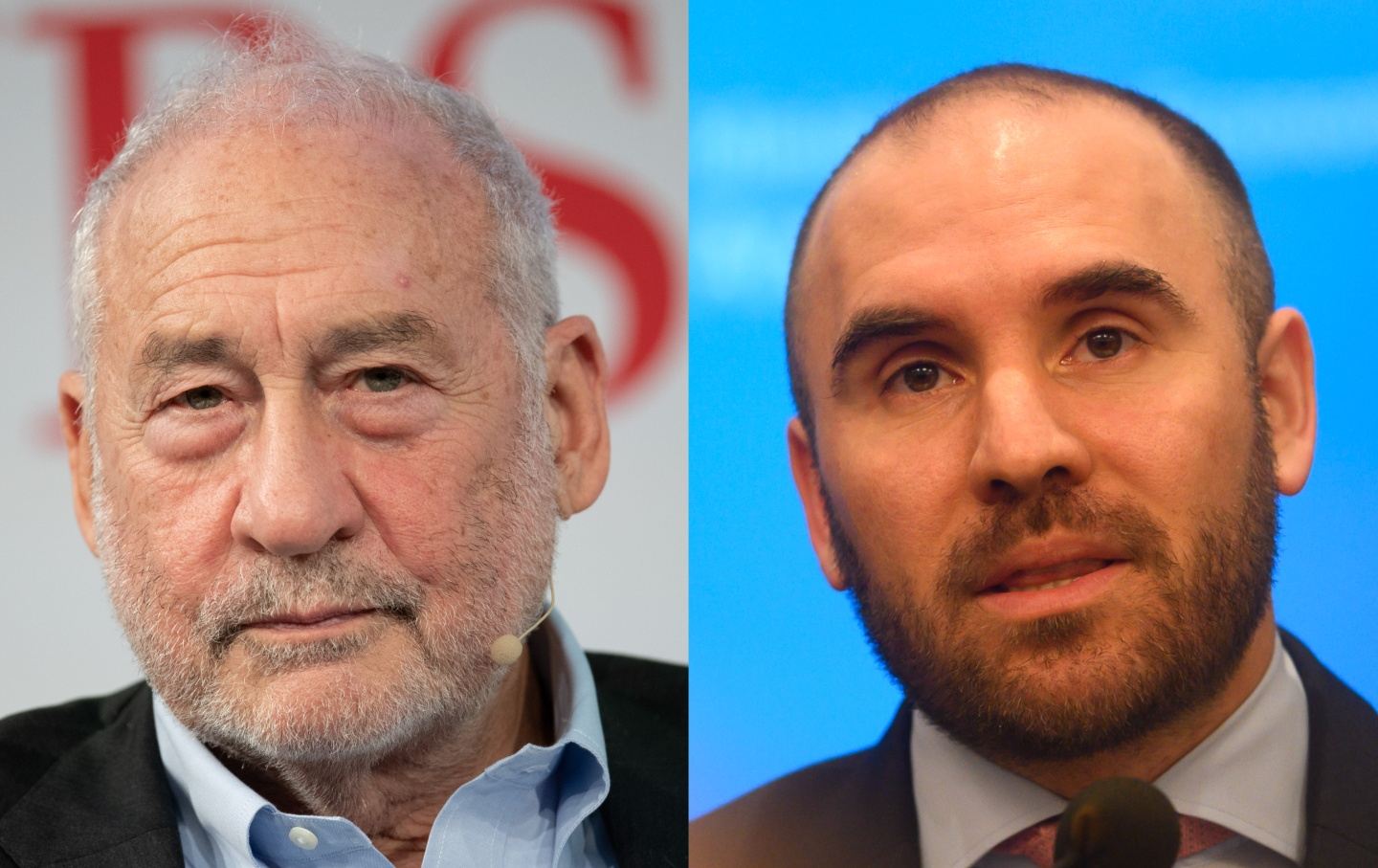Harris’s Gaza Policy Was a Disaster on Every Level
Palestine may not have swung the election one way or another. But Democrats unquestionably paid a high price for their refusal to hold Israel accountable.

Kamala Harris, campaigning in Washington, DC, on October 29, 2024, faces protests from hundreds of people expressing disapproval of her administration’s Gaza policy.
(Celal Gunes / Anadolu via Getty Images)One of the most hotly debated questions of the 2024 campaign was what impact the Biden administration’s disastrous and malicious handling of the genocide in Gaza would have on Democrats’ ability to hold the White House. Now that the election is over, and Donald Trump has won, we are beginning to have more definitive answers to that question.
By now it is clear that Trump was able to capitalize upon broad, mass discontent with the administration on a litany of economic and political fronts, while Kamala Harris was saddled with the baggage of Joe Biden’s image and policy program. Trump won every single battleground state that ultimately decided the election; he could have lost both Michigan and Wisconsin and still won the presidency.
Clearly, Gaza alone does not explain such a sweeping victory. But even so, the evidence shows that Harris’s failure to break with Biden’s policy of unconditional support to Israel came with a political cost—one that was higher than many had expected.
The drop in support for Harris among Arab Americans compared to 2020 was significantly higher in both scale and depth than her underperformance more broadly. For example, Biden received 82 percent of the vote in the eastern section of Dearborn alongside an overwhelming 88 percent in the southernmost parts of the city. These are overwhelmingly Arab areas, and southern Dearborn is also majority-Muslim. In 2024, Harris received only 23 percent and 13 percent of the vote in the eastern and southern parts of Dearborn, respectively. This nearly 60-point drop in support for the top of the Democratic ticket in just four years can largely be attributed to the extreme anger with the president on Palestine and Lebanon, with the Biden administration supplying the weapons Israel has used to eviscerate human life in Gaza and displace over 1.2 million Lebanese civilians.
Similarly, in Paterson, New Jersey, or “Little Ramallah/Istanbul” as it is known by many of its Arab and Turkish residents, Harris also suffered losses that ran much deeper than they did on a national scale. While Biden got 70 percent of Paterson’s vote in 2020, Harris was only able to secure around 42 percent, making it clear that this anger went beyond just Michigan and impacted Arab American communities across the country.
In the months before the election, some believed that most Arab Americans, despite their fury at Biden and their disappointment with Harris’s inability or unwillingness to distinguish herself in the Middle East, would eventually come home and vote for her anyway. This has been proven resoundingly false. Nor was this a case of voters’ incoherently lashing out. The relatively decent performance of Elissa Slotkin, who called for conditioning aid to Israel while Harris did not, proves that the discontent was not rooted in a total rejection of the Democratic Party but rather a particular kind of politics within the party. Most impressively, Palestinian American Rashida Tlaib easily secured her fourth term in Congress with more than 62 percent of the vote in Dearborn.
We are no longer in an era where the Arab American vote can be taken as a given, especially as more people find contradictions in Democratic rhetoric and Democratic behavior regarding Palestine and the lives of Arabs more broadly.
People will surely read this piece and ask, what could Democrats have done differently? There were endless opportunities for initiatives both large and small to be undertaken in an attempt to reconcile with Arab Americans. First and foremost, Harris could have chosen to allow a Palestinian American to speak to the pain of her people and nation at the Democratic National Convention. Many members of Congress, alongside the United Auto Workers and various Jewish American political organizations, were urging her to grant Palestinians a platform. Her refusal to do so—a decision some reports have claimed was made under pressure from her national security advisers—sent the message that she would do virtually nothing to earn Arab American votes, or the votes of anyone who was concerned about the genocide more broadly.
Even after the DNC snub, the Uncommitted National Movement still tried to make peace with Harris, asking her to meet with their membership as well as the families of Palestinian and Lebanese victims of Israeli aggression. Again, Harris refused.
While putting aside for a moment that suspending assistance to a country that inhibits the delivery of humanitarian aid is required by law, there were also a variety of things that Harris could have pledged short of an arms embargo which would have gone a long way towards the restoration of trust: a pledge to recognize the State of Palestine within a certain amount of time from the day she was inaugurated, for example, or a promise to restore and increase vital funding to UNRWA, which continues to be attacked by the Israelis on a day-by-day basis. Unlike Biden, who promised (and yet failed) to reopen the Palestinian consulate in the city of occupied East Jerusalem during his 2020 bid, Harris made no specific overtures, only vague promises to end the wars in Gaza and Lebanon.
And, of course, Harris could have refused to tie herself to people like Dick Cheney, who has the blood of millions of Arabs and Muslims on his hands. She could have also kept those who promote fanatically one-sided and pro-Israel rhetoric like Ritchie Torres and Bill Clinton away from Michigan instead of sending them there. And she could and should have, at any point, signaled that she would enforce the laws of her own country on the issue of weapons transfers in a more meaningful way than her boss.
It’s not that any of these things would have changed the outcome of the election, given that Palestine and Gaza were not decisive on their own. But they could have reinforced her coalition at a time in which she desperately needed it. They would have shown her willingness to break with Biden on a key issue, thus sending a broader signal about her independence from her deeply unpopular boss. They would have given many young and demoralized voters of all backgrounds a reason to be enthusiastic about her candidacy. They would have countered Trump’s claims that only he could bring peace and stability to the region. Most importantly, however, they would have been the right thing to do for a community that has suffered at the hands of the country in which they live. It would have been the chance for something of a reset or rehabilitation. Instead, Harris repeatedly insisted that she’d have done nothing differently from Biden.
But the time to litigate these choices will soon be over. Biden and Harris will be gone, and Trump is signaling that he will be even more pro-Israel and anti-Palestinian than his predecessor. While this seems a high bar to clear, especially after Antony Blinken has revealed that there’ll be no real consequences for Israel’s refusal to adhere to US and international humanitarian law, a second Trump presidency will see the likes of Mike Huckabee and Elise Stefanik at the helm of his foreign policy and Middle Eastern political programs. The former has said that there’s not really such a thing as a Palestinian and the latter has worked to root out anti-Zionist activism on university campuses. Both of them are open supporters of the unilateral annexation of what remains of occupied Palestine. While the threat of annexation is not in and of itself a death blow to Palestinian national consciousness, it is nonetheless indicative of the viciously anti-Palestinian sentiment that pervades the Republican Party and conservative politics writ large. It is up to those who take seriously the prospect of Palestinian liberation to make sure that the cause remains an internationalized issue and one for which damaging it bears real political costs.
There will be some within the American liberal milieu who suddenly, with Trump’s return to the White House, find their opposition to Israeli colonialism in their back pocket and bring it out into the light. There will be others who, wrongfully resentful of Arab American political independence and incorrectly assuming that we are to blame for Harris’s loss, will find perverse joy in the suffering of Arab Americans and their kin abroad under Trump’s watch. It will be prudent to ignore the latter and channel the former as best we can. Thomas Friedman once wrote in TheNew York Times that Biden would be the last pro-Israel Democrat to ever be president, and while I do not think that this is a given, it is incumbent upon us to make sure that whoever comes after Trump is someone who stands resolutely against apartheid and supports the right of Palestinians to dignity and freedom in both words and action.
No matter what the next four years bring, Palestine will not be erased permanently and will not be sent to the graveyard of history. Seventy-six years of struggle have come and gone. Presidents from Reagan, to Trump, to Biden, and Trump again have tried, and they alongside Israel have all failed to force the people of Palestine to go away.
Popular
“swipe left below to view more authors”Swipe →I am reminded of an Edward Said quote from an essay that he wrote in 2003 on the Roadmap for Peace proposed by then-President George W. Bush, mere months before Said left our world: “It may seem quixotic for me to say that even if the immediate prospects are grim from a Palestinian perspective, they are not all dark. I return to the stubbornness I mentioned, and the fact that Palestinian society—devastated, nearly ruined, desolate in so many ways—is, like Hardy’s thrush in its blast-beruffled plume, still capable of flinging its soul upon the growing gloom.”
Flinging our souls upon the growing gloom is our only choice.
Support independent journalism that exposes oligarchs and profiteers
Donald Trump’s cruel and chaotic second term is just getting started. In his first month back in office, Trump and his lackey Elon Musk (or is it the other way around?) have proven that nothing is safe from sacrifice at the altar of unchecked power and riches.
Only robust independent journalism can cut through the noise and offer clear-eyed reporting and analysis based on principle and conscience. That’s what The Nation has done for 160 years and that’s what we’re doing now.
Our independent journalism doesn’t allow injustice to go unnoticed or unchallenged—nor will we abandon hope for a better world. Our writers, editors, and fact-checkers are working relentlessly to keep you informed and empowered when so much of the media fails to do so out of credulity, fear, or fealty.
The Nation has seen unprecedented times before. We draw strength and guidance from our history of principled progressive journalism in times of crisis, and we are committed to continuing this legacy today.
We’re aiming to raise $25,000 during our Spring Fundraising Campaign to ensure that we have the resources to expose the oligarchs and profiteers attempting to loot our republic. Stand for bold independent journalism and donate to support The Nation today.
Onward,
Katrina vanden Heuvel
Editorial Director and Publisher, The Nation
More from The Nation

Is Mark Carney a Climate Radical? Is Mark Carney a Climate Radical?
Canada’s prime minister–designate backs the science that says most fossil fuel can’t be burned.

We Need to Turn Our Outrage Way Up We Need to Turn Our Outrage Way Up
This is no time to sit idly by. People’s lives are at stake. We have to put our bodies on the line.

Columbia Is Betraying Its Students. We Must Change Course. Columbia Is Betraying Its Students. We Must Change Course.
The administration is choosing complicity over courage in the case of Mahmoud Khalil. It’s time for the faculty to demand a new path.

Breaking Democracy Breaking Democracy
Shredding the Constitution and Rule of Law.

Going for Green: Uruguay’s Renewable Energy Revolution Going for Green: Uruguay’s Renewable Energy Revolution
With no fossil fuel reserves to rely on and domestic demand rising, the country had to get creative—or go broke just trying to keep the lights on. Here’s how they did it.

How New York Can Help End the Global Debt Crisis How New York Can Help End the Global Debt Crisis
Economists Martín Guzmán and Joseph Stiglitz explain how state-level changes can assist the 3.3 billion people living in countries that spend more on debt service than health care...


